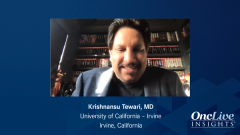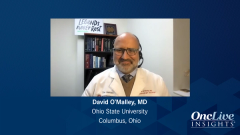
Sequencing Therapy for MSI-High and MMR-Proficient Endometrial Carcinomas
A discussion on the best way to sequence therapies for patients with MSI-high and MMR-proficient endometrial carcinoma.
Episodes in this series

David O’Malley, MD: Krish, before all these trials come out, after carboplatin with paclitaxel, how are you sequencing these MSI [microsatellite instability]-high and MMR [mismatch repair] proficient patients?
Krishnansu Tewari, MD: Until these trials report, I have the GYO18 trial open at 2 of the sites I go to, and you’re not biomarker restricted to enroll patients on that. If they have measurable disease, that’s where they’re going. In the absence of the trial being open at the third site I practice at, I am going to need to know their MSI status. I’m going to treat those patients who are MSI stable with pembrolizumab plus lenvatinib. If they’re MSI high, I’m going to give them pembrolizumab.
Bradley Monk, MD, FACOG, FACS: Don’t forget dostarlimab. There was a 46% response rate in 103 patients, FDA-approved on August 17th, 2021. Dostarlimab is a good medication, and it’s here to stay. The RUBY trial hopefully will integrate it into the front line.
David O’Malley, MD: Perfect. MMR proficient patients are treated with the RUBY trial. Let’s say you unblind her, and you find out she was treated with dostarlimab. What are you going to do now?
Bradley Monk, MD, FACOG, FACS: I have to put her on a clinical trial, and we don’t have good clinical trials for that, so we have our work cut out.
David O’Malley, MD: How about lenvatinib with pembro [pembrolizumab] after previous I/O [immuno-oncology] therapy?
Bradley Monk, MD, FACOG, FACS: I don’t know.
David O’Malley, MD: There is no data. We need that trial, don’t we?
Krishnansu Tewari, MD: If there’s no clinical trial, that’s a good option.
David O’Malley, MD: We don’t have that data. Those patients were not allowed to enroll onto the KEYNOTE-775 trial. But a lot of us have used it; clearly, that’s off label. I shouldn’t say it’s off label. It just says you had to have previous chemotherapy; it doesn’t say you couldn’t have previous I/O. It has had some benefit, but I want that trial to be done to see what our true response rate is in those patients.
Bradley Monk, MD, FACOG, FACS: It’s about prioritization. As you know, we have the antibody-drug conjugate [ADC] tisotumab vedotin in second-line cervical cancer. We have positive data for mirvetuximab soravtansine, a folate receptor antibody-drug conjugate in ovarian cancer, and it will be the next ovarian cancer approval. We need an antibody-drug conjugate in this I/O-exposed population, whether its Trop-2 or whether its tissue factor. There are other tissue factor ADCs like tisotumab vedotin; tissue factor is overexpressed in endometrial cancer.
David O’Malley, MD: Folate receptor alpha?
Bradley Monk, MD, FACOG, FACS: Yes. We need to take a playbook out of these folate receptor alpha or tissue factor ADCs. I think rather than trying to pound the I/O square peg through the I/O-exposed round hole, we need to shift to another class of agents as we’re doing in cervical and ovarian cancer ADCs.
David O’Malley, MD: Amazing. Krish, bring us home.
Krishnansu Tewari, MD: For a long time, I think the progress in endometrial cancer has faltered compared to the other cancers we take care of: ovarian and cervical. I think the next 2 years are going to be the years when we really break down the walls that have been hindering us and preventing us from giving patients who are struggling with these advanced and recurring endometrial cancers really effective therapy. I’m really encouraged.
Bradley Monk, MD, FACOG, FACS: Thanks, Krish, I agree. It’s been great being here today.
David O’Malley, MD: Wonderful. Thank you for having me.
Krishnansu Tewari, MD: Thank you.
Transcript edited for clarity.







































